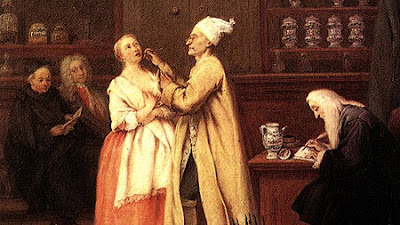When General George Washington assumed command of the American army in July, 1775, one of his primary concerns was preventing his troops from being exposed to the smallpox virus. From Washington's perspective, "smallpox is in every part of Boston. The [British] soldiers who have never had it are, we are told, under inoculation, and considered as a surety against any attempt of ours to attack. If we escape the smallpox in this camp, and the country around, it will be miraculous. Every precaution that can be is taken, to guard against this evil, both by the General Court and myself."
Although smallpox was present in 1775 Boston, it did not reach the catastrophic levels Washington believed existed. Nevertheless, the general and his staff were concerned that the British army could utilize the disease as a biological weapon. Historians and period accounts have suggested British authorities occasionally explored the use of smallpox as a means to weaken or eradicate enemies. For example, evidence suggests Lord Jeffery Amherst authorized a plan to expose Native Americans to smallpox. General Thomas Gage allegedly approved a bill in 1763 for "Sundries got to Replace in kind those which were taken from people in the Hospital to Convey the Smallpox to the Indians." In 1777, a British officer suggested to defeat the American rebellion the military should "dip arrows in matter of smallpox, and twang them at the American rebels.... This would ... disband these stubborn, ignorant, enthusiastic savages.... Such is their dread and fear of that disorder."
Although smallpox was present in 1775 Boston, it did not reach the catastrophic levels Washington believed existed. Nevertheless, the general and his staff were concerned that the British army could utilize the disease as a biological weapon. Historians and period accounts have suggested British authorities occasionally explored the use of smallpox as a means to weaken or eradicate enemies. For example, evidence suggests Lord Jeffery Amherst authorized a plan to expose Native Americans to smallpox. General Thomas Gage allegedly approved a bill in 1763 for "Sundries got to Replace in kind those which were taken from people in the Hospital to Convey the Smallpox to the Indians." In 1777, a British officer suggested to defeat the American rebellion the military should "dip arrows in matter of smallpox, and twang them at the American rebels.... This would ... disband these stubborn, ignorant, enthusiastic savages.... Such is their dread and fear of that disorder."
Of course, many colonists believed the British army planned to intentionally introduce small pox to the Massachusetts population. One Boston resident noted as early as January, 1775 that "soldiers try all they can to spread the smallpox but I hope they will be disappointed." Seth Pomeroy wrote in May 1775, "If it is In General Gages power I expect he will Send ye Small pox." On December 3, 1775, Robert H. Harrison noted that "four [British] deserters have just arrived at headquarters giving an account that several persons are to be sent out of Boston . . that have lately been inoculated with the smallpox, with the design, probably, to spread infection to distress us as much as possible."
Washington's suspicions were corroborated when he received a report that "General Howe is going to send out a number of the Inhabitants. ... A Sailor says that a Number of these coming out have been inoculated with the design of Spreading the Small pox through this Country and Camp." Three days later, the general grimly reported to Congress "the information I received that the Enemy intended spreading the smallpox amongst us, I could not suppose them capable of; I now must give some credit to it, as it has made its appearance on several of those who last came out of Boston."
Fortunately, Washington was proactive in combating the spread of the disease. Less than twenty four hours after his arrival outside of Boston, the general cautioned soldiers against travelling to infected areas "as there may be danger of introducing smallpox into the army." By July 20th, Washington noted in correspondence to Congress that he had "been particularly attentive to the least Symptoms of the Small Pox, hitherto we have been so fortunate, as to have every Person removed so soon, as not only to prevent any Communication, but any Apprehension or Alarm it might give in the camp. We shall continue the utmost Vigilance against this most dangerous Enemy."
Lieutenant Colonel Loammi Baldwin was ordered to "prevent any of your officers from any intercourse with the people who ... came out of Boston . . . there is great reason to suspect that the smallpox is amongst them, which every precaution must be used to prevent its spreading." The efforts appeared to have been somewhat successful as General Horatio Gates later commented to Artemas Ward that Washington had "taken every possible precaution in his power ... to prevent the Enemy from communicating this infection of the Small pox to this Army."
Photograph by Jack Boudreau
Two days after the British fled from Boston, Washington ordered Israel Putnam and one thousand Continental Soldiers to occupy a key position outside of the town. The general was so concerned about exposure that he also specified that all of the troops assigned to Putnam must have already had smallpox and thus were immune to the virus.
.


No comments:
Post a Comment